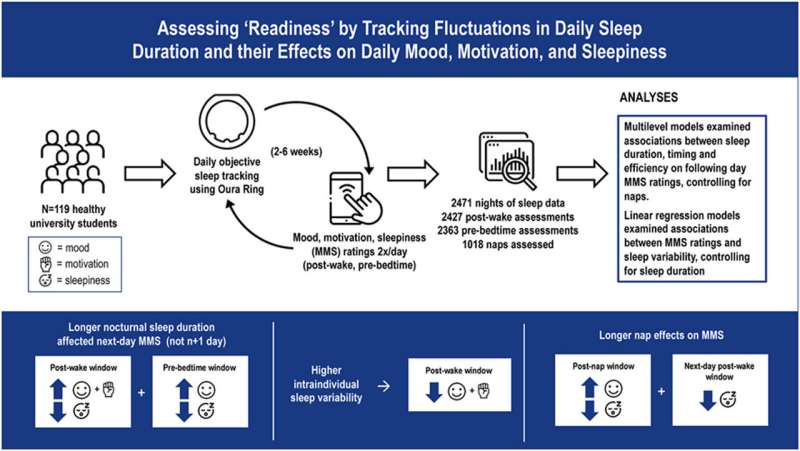Assessing readiness by tracking sleep duration and effects on daily mood, motivation, sleepiness

A good night’s sleep prepares us for the next day. Conversely, inadequate sleep diminishes performance in tasks requiring attention, memory, and executive functions that have real world consequences.
“Readiness scores” currently provided by consumer fitness and sleep trackers were designed to predict physical performance rather than how we would handle daily tasks and social interactions. Both manufacturers and users loosely assume the latter as well but that has never been scientifically tested. A simple gauge of preparedness to take on a new day would be highly desirable.
Professor Michael Chee, Assistant Professor Stijn Massar and Alyssa Ng from the Center for Sleep and Cognition at the Yong Loo Lin School of Medicine, National University of Singapore (NUS Medicine) led work to create such a gauge by having 119 university students report their mood, motivation, and sleepiness (MMS) after waking and before going to bed, daily for between two to six weeks. The findings are published in the journal Sleep Medicine.
Self-reported sleepiness relates to poorer performance in tasks requiring vigilance, such as driving and has also been associated with reduced motivation to engage in social or physical activities. Better mood can result in more productive behavior, better job performance and higher academic achievement. Finally, higher motivation has been tied to greater productivity among working adults and higher grade-point averages in students.
Sleep was measured with Oura Rings and cross-referenced with smartphone app based self-reports that also captured daytime naps and their duration.
Nights with longer sleep than the participant’s average were associated with better mood, higher motivation, and lower sleepiness in the post-wake period. Better scores in mood and sleepiness persisted into the pre-bedtime period. Interestingly, these associations between nocturnal sleep and MMS did not affect ratings for the subsequent day, meaning that a good night of sleep following a poor one could be helpful to restore one’s social function.
Irregularity of sleep duration over a week had a negative impact on MMS ratings, extending work done elsewhere that found multiple ill effects of having irregular sleep duration.
Significant associations between MMS and nap duration suggest that day-time naps may alleviate the effects of inadequate nocturnal sleep that university students are well known for.
Attesting to the importance of personalized sleep information, a person’s average sleep duration did not significantly predict between-subjects differences in average mood or motivation ratings in the post-wake window. This suggests that there are significant interindividual differences in the amount of sleep necessary to maintain mental well-being.
“This work lends credibility to provision of a daily ‘readiness’ score for purposes other than athletic performance based on measurements of nocturnal sleep duration,” said Alyssa Ng the graduate student who drove the work.
“People say they know all they need about their sleep within a few weeks of using a sleep tracker but our work suggests, there is real value in continuing to measure sleep to help you judge when to push it and when to hold back in work or social settings,” said Professor Chee who has been a significant contributor to research evaluating the utility of wearable sleep trackers.
More information:
Alyssa S.C. Ng et al, Assessing ‘readiness’ by tracking fluctuations in daily sleep duration and their effects on daily mood, motivation, and sleepiness, Sleep Medicine (2023). DOI: 10.1016/j.sleep.2023.09.028
Journal information:
Sleep Medicine
Source: Read Full Article